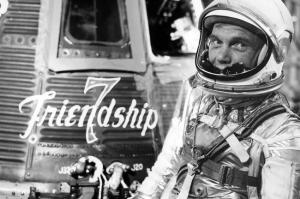Year born: 1921
Research Areas: Space Flight, Politics
"Space Flight, Politics"
Source: Times Standard, Dec 2016

Early Life
John grew up in Ohio, USA. His father was a plumber and his mother a teacher. He loved flying from an early age. He first went in a plane when he was 8 years old. John liked to spend his time building model aeroplanes. He was an enterprising child, washing cars and selling rhubarb to earn money to buy a bicycle. He played sports in school, including American football, basketball, and tennis. John studied chemistry at Muskingum College, Ohio. He left college before completing his degree to join the Army. John flew fighter planes during World War II and the USA - Korean War.
Career Highlights
John trained as a test pilot. Test pilots fly newly designed aircraft. Engineers gather data about how well the aircraft works during test flights. It can be a risky job. During John’s first flight the cockpit depressurized, and its oxygen system failed. In 1957, John made the first supersonic (faster than the speed of sound) coast-to-coast flight across America.
John was a test pilot during the space race. This was a time when the USA and USSR competed to achieve firsts in space flight. NASA selected their first astronauts in April 1959 and John was one of them. The group was called the Mercury 7. In 1962, John became the first American to orbit the Earth, the third American in space, and the fifth human in space.
John left NASA in 1964 and decided to go into politics. Voters elected John to the U.S. Senate in 1974. He was a U.S. Senator for 24 years. John used his expertise in science and technology as a politician. He focussed on making the government more efficient and worked to help older people. In 1988, John became the oldest person to fly to space. Aged 77, John helped scientists research the ageing process and understand how space affects people of different ages.
John’s greatest political contribution was The Nuclear Non-Proliferation Act of 1978. This piece of law made sure that the USA would only work with countries who agreed not to use nuclear materials for weapons. John hoped that this law would make the world safer.
Legacy
John was welcomed into the U.S. Astronaut Hall of Fame in 1990 and received the Presidential Medal of Freedom in 2012. John founded the John Glenn College of Public Affairs.
Other Interests
John enjoyed boating and skiing in his spare time. He was also a businessman. He ran a cola company and owned several hotels.
